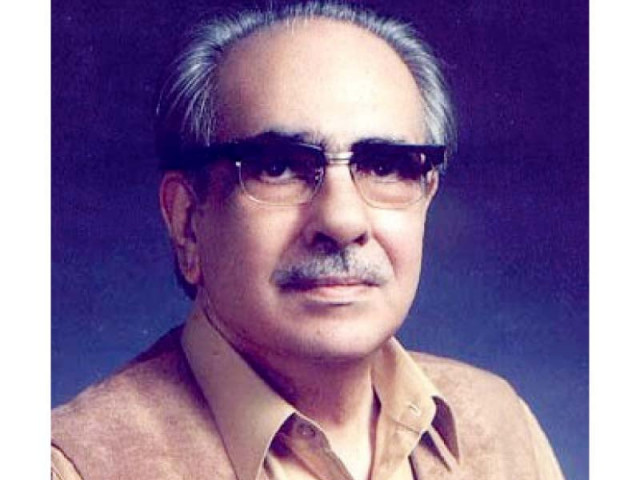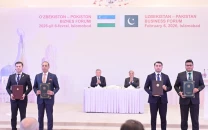Jamiluddin Aali dies aged 90
Before Partition, he was an assistant at the commerce ministry of British-ruled India

Jamiluddin Aali dies aged 90
Aaliji, as he is fondly referred to, was a literary celebrity, renowned for his Urdu ghazal and doha poetry, as well as columns and essays.
He has left behind three sons, two daughters and millions of fans to mourn after him. His funeral prayers will be offered at Tuba Masjid in Defence Phase-II Extension at 4pm today (Tuesday).
Profile
Born on January 20, 1925 to Nawab Sir Amiruddin Ahmed Khan of Loharu, Aaliji migrated to Karachi on August 13, 1947, on the last train from Delhi.
Before Partition, he was an assistant at the commerce ministry of British-ruled India. After migrating to Pakistan, he passed the elite bureaucracy exam (Central Superior Services) before being posted as an income tax officer in Karachi in 1952.
Aaliji rose to become a senior executive vice-president and a member of the executive board of the National Bank of Pakistan. He also served as an as adviser to the Pakistan Banking Council before retiring in 1990.
The writer within
Notwithstanding his professional capabilities as a banker, it was his love for the written word that propelled him to national fame. He was one of the founding fathers of the Pakistan Writers Guild, where he initiated five annual literary awards that would continue for several years to come.
One of his greatest achievements, for which the literary society holds him in the highest regard, is the revival of the classical form of doha and its adaptation to Urdu. He has also written numerous ghazals, poems and lyrical ballads.

The longer versions of his poems presented discourses on scientific and philosophical themes, which were meant to awaken the audience to these ideas. In contrast, his prose mainly focused on travelogues and the documentation of his many travels to foreign cultures.
Paying tribute to his futuristic thinking in his columns and his contribution to Urdu, poet Pirzada Qasim Raza Siddiqui told The Express Tribune that Aaliji had always worked for the betterment of Urdu and its literati, and was pivotal in taking forward the mission of Maulvi Abdul Haq, called Baba-e-Urdu or the father of Urdu. “He was also patriotic to the core, a sentiment that is reflected in the many patriotic songs that he penned over the years,” he said.
Love for the language
Aaliji had been associated with Pakistan’s Anjuman-e-Taraqqi-e-Urdu (Council for the Promotion of Urdu) for the last 55 years, through which he worked tirelessly for the development of the national language. He served as the president of the Urdu Dictionary Board for three years.
An associate of Aaliji, Rauf Parekh who has served the Urdu Dictionary Board as chief editor, recalled his mentor as a man of love.
“He treated everyone, from his subordinates to his peers, with love and affection,” he told The Express Tribune. “His undying love and efforts for the Urdu language were his most important traits. He devoted 50 years of his life to writing columns and poetry and to the Anjuman-e-Taraqqi-e-Urdu.”
For his untiring efforts and devotion to the language, the government bestowed upon Aaliji three national awards: the President’s Pride of Performance Gold Medal in 1992, Hilal-e-Imtiaz (Urdu Literature) in 2003 and Kamal-e-Funn Award in 2006.
Noted critic and scholar Prof Sahar Ansari believes few individuals have in their personal capacity contributed as much as Aaliji has for the national language. “From the establishment of the Urdu university to breathing life into Anjuman-e-Taraqqi-e-Urdu, Aali has an extraordinary body of work to his credit,” he said.
Published in The Express Tribune, November 24th, 2015.


















COMMENTS
Comments are moderated and generally will be posted if they are on-topic and not abusive.
For more information, please see our Comments FAQ